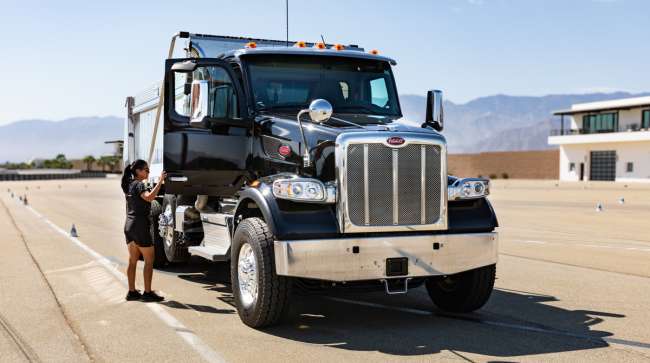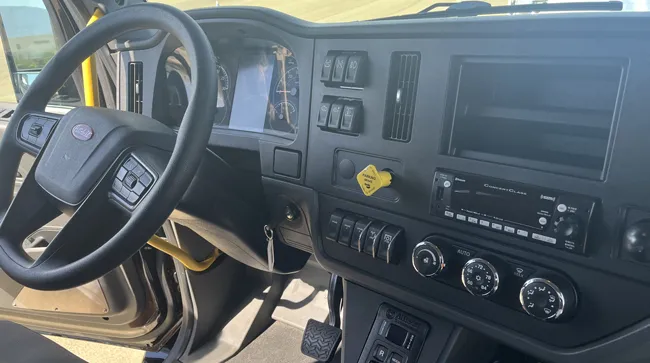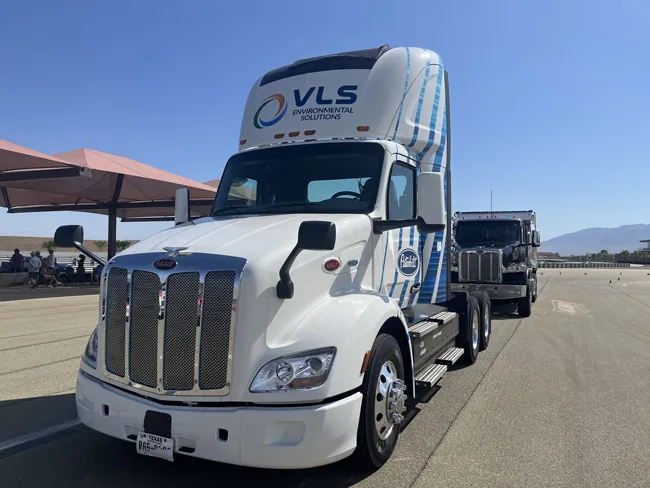Features Coordinator
Peterbilt Provides Vocational, Medium-Duty Product Updates

[Stay on top of transportation news: Get TTNews in your inbox.]
PALM SPRINGS, Calif. — Peterbilt is upgrading its work truck and medium-duty truck lineups to address the buying criteria of its customers and stay ahead of current and upcoming emissions and safety regulations.
The truck maker detailed recent updates to its vocational and medium-duty truck models Oct. 1 at its Vocational VIP Customer event.
Peterbilt’s premier refuse truck, the Model 520, has seen improvements including standard body connectors, improved cable routings and upgraded safety features such as Bendix Fusion.
“We’re continuing to enhance our 520 and 567 models to meet our market share goals,” said Ben Whitaker, Peterbilt’s vocational marketing manager.

Inside a Peterbilt Model 537. (Mike Senatore/Transport Topics)
For powertrains, Peterbilt and parent company Paccar offer three MX engine variants for heavy-duty models: the MX-11 which provides superior fuel efficiency; the MX-13 EPA engine designed to comply with Environmental Protection Agency regulations; and a California Air Resources Board-certified MX-13 variant.
“We are going to be the first OEM to offer a CARB-certified diesel engine, and this is going to allow customers in California and other CARB-adopting states to continue to purchase and run diesel engines,” Whitaker said.
The CARB-certified variant comes with improvements to the crankshaft, injectors and aftertreatment system, and a 48-volt generator mounted on the truck’s flywheel. It will be available in both 510- and 455-horsepower ratings.
McLeod Software CEO Tom McLeod explores the potential for artificial intelligence to boost efficiency and build resilience. Tune in above or by going to RoadSigns.ttnews.com.
Paccar’s TX-18 Pro transmission provides high performance both on- and off-highway and is tailored to handle more taxing vocational use than the standard TX-18. The Pro variant offers vocational-specific features such as six reverse gears — compared with the standard TX-18’s three — extreme duty clutch, and a rock free mode.
Peterbilt also provided a product update for its medium-duty lineup, including transmission enhancements and engine hardware upgrades to address upcoming regulatory tightening and meet customer demand.
“[The TX-8 transmission] has been really big for our medium-duty product because it feels like you’re driving a pickup truck, and if you think about the Class 5, 6 and 7 market, you have drivers that want that feel and want that drive,” said Tiffany Cavazos, Peterbilt’s medium-duty marketing manager.
Peterbilt and Paccar are focusing on optimizing vehicle performance to increase uptime across the board. They’re doing this with initiatives such as enhancing the Paccar powertrain with Prognostics, a proactive repair guidance feature meant to ease the maintenance process.
Also at the event, Peterbilt highlighted its EV and alternative fuels product lineups, stressing the increased regulatory hurdles that manufacturers are facing that are expected to ramp up even further in the coming years.

Peterbilt Model 579EV. (Mike Senatore/Transport Topics)
These lineups include battery-electric versions of a number of Peterbilt’s vocational and medium-duty models, including the Model 579EV designed for regional drayage, the Model 520EV for refuse pickup, and the Model 220EV for more versatile dry-van operations.
“What we’ve really focused on is having an EV lineup where we put EVs in applications where it makes sense to use them today,” said Patrick Wallace, Peterbilt’s zero emissions and alternative powertrain marketing manager. “One example is our 520EV; the refuse folks are [operating in] urban environments, doing a lot of stop-and-go … so with [features like] regenerative braking, it just works really well.”
In addition to its electric vehicle offerings, Paccar Parts has invested significantly in its EV charging and infrastructure products and deployment teams. The range of products includes a variety of installation types, including wall mounts, pedestal and mobile implementation, with varying levels of power tailored to different charging schedules, such as overnight or opportunity charging.
“Understanding that your solution is going to be very unique, we’re here to help [our customers] with anywhere from 19.2-kilowatt chargers to 350 kilowatts,” said Jennifer Davis, Paccar Parts’ senior EV charger sales manager. “We have strong partnerships not only with our suppliers but also with our dealerships. … We want to be able to guide [customers] to make it easier for [them] to deploy it.”
Peterbilt is also taking steps to improve its own operational efficiency, including reshoring much of its supply chain to protect it from the effects of geopolitical circumstances. Bobby Sanders, vocational sales manager, shared that updates to the company’s Denton, Texas, facility include the implementation of automated guided vehicles to more easily change the flow of the plant and generally increase flexibility.
Want more news? Listen to today's daily briefing below or go here for more info:





